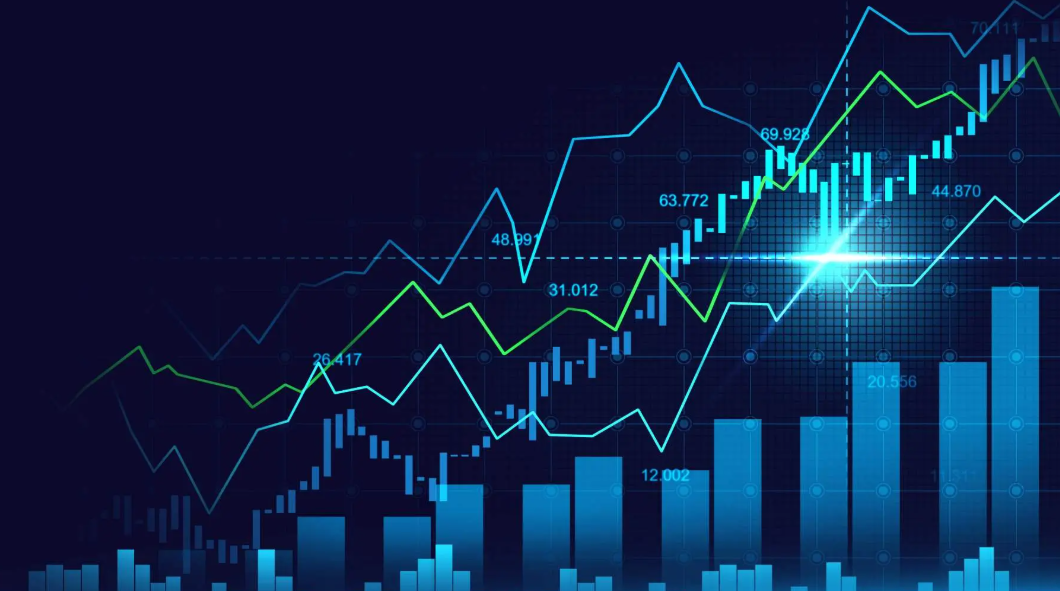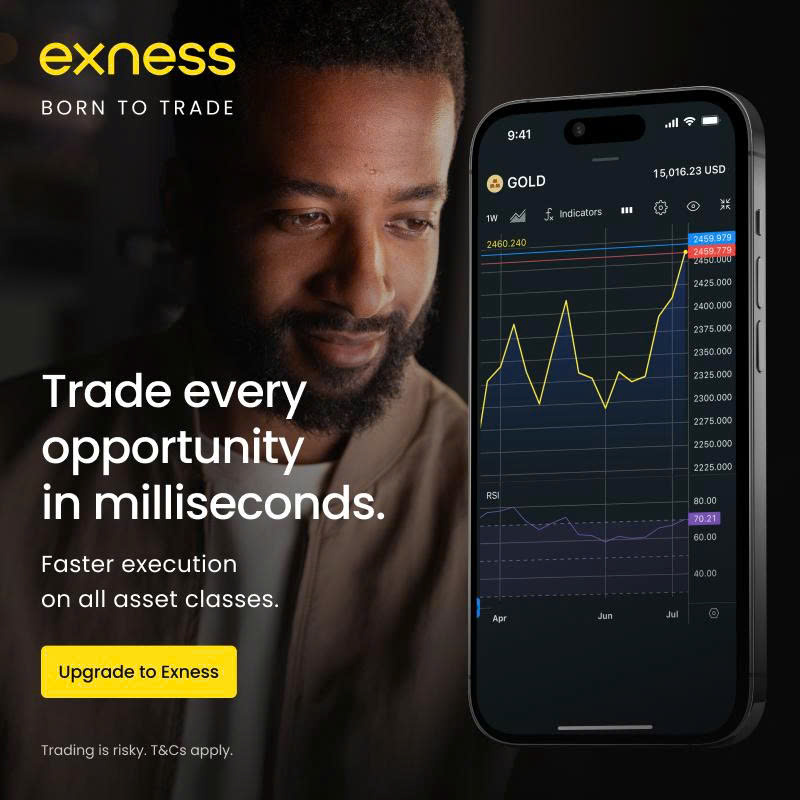
7 minute read
How Much Do I Need to Start Forex Trading in Nigeria?
from Start Forex Nigeria
So, you’re curious about forex trading in Nigeria and wondering, “How much do I need to start forex trading in Nigeria?” The good news? You don’t need a fortune to dive into the forex market. In fact, you can start with as little as $10 (about ₦15,000), but the ideal amount depends on your goals, trading style, and risk tolerance. In this guide, I’ll break down everything you need to know about the capital required, costs to expect, and how to start forex trading in Nigeria like a pro—all in a beginner-friendly. Let’s get started!
Top 4 Best Forex Brokers in Nigeria
1️⃣ Exness: Open An Account or Visit Brokers 🏆
2️⃣ XM: Open An Account or Visit Brokers 💥
3️⃣ JustMarkets: Open An Account or Visit Brokers ✅
4️⃣ Quotex: Open An Account or Visit Brokers 🌐
Why Forex Trading in Nigeria?
Forex trading is booming in Nigeria, with over 500,000 active traders and a daily trading volume of $1.25 million, according to recent stats. Why? It’s accessible, operates 24/5, and offers the potential for high returns. Whether you’re in Lagos or Abuja, all you need is a smartphone, internet, and some capital to trade global currencies like USD/NGN or EUR/USD. But before you jump in, let’s tackle the big question: How much cash do you really need?
Minimum Capital to Start Forex Trading in Nigeria
The amount you need to start forex trading in Nigeria depends on the broker, account type, and your trading strategy. Here’s a quick breakdown:
Micro Accounts: These are perfect for beginners. Many brokers, like Exness or FXTM, let you start with as little as $10 to $100 (₦15,000–₦150,000). Micro accounts allow you to trade micro-lots (1,000 units of currency), keeping your risk low.
Mini Accounts: For intermediate traders, mini accounts often require $100–$500 (₦150,000–₦750,000). These accounts let you trade mini-lots (10,000 units), offering more flexibility.
Standard Accounts: Aimed at experienced traders, these typically require $500–$1,000 (₦750,000–₦1,500,000) or more. They allow trading standard lots (100,000 units) with access to higher leverage.
Pro Tip: While some brokers advertise starting with just $1, it’s not practical for long-term success. A starting capital of $100–$500 is recommended for better risk management and flexibility.
Factors That Affect Your Starting Capital
Not all traders are the same, and your starting capital will depend on a few key factors. Let’s break them down:
1. Your Trading Style
Your trading style heavily influences how much capital you need:
Scalping: This fast-paced strategy involves quick trades for small profits. Scalpers need at least $500 to cover tight spreads and rapid trades.
Day Trading: Opening and closing trades within a day requires $200–$500 to manage daily market swings.
Swing Trading: Holding trades for days or weeks means you can start with $500–$1,000 for more flexibility and lower transaction costs.
2. Risk Tolerance
How much are you willing to lose on a single trade? A golden rule in forex is to risk only 1–2% of your capital per trade. For example:
With $100, you’d risk $1–$2 per trade.
With $1,000, you’d risk $10–$20 per trade.
Starting with a larger amount gives you a buffer to absorb losses without wiping out your account.
3. Leverage
Leverage lets you control larger positions with less money. In Nigeria, brokers often offer high leverage (up to 1:1000). For instance, with $100 and 1:1000 leverage, you can control a $100,000 position. But beware—high leverage amplifies both profits and losses. Beginners should stick to lower leverage (e.g., 1:50) to stay safe.
4. Broker Requirements
Different brokers have different minimum deposit requirements:
Exness: As low as $10 for micro accounts.
FXTM: Starts at $50 for Naira-based accounts.
Pepperstone: No minimum deposit, but $200 is recommended for practical trading.
Always choose a regulated broker (by the SEC, CBN, or international bodies like FCA or CySEC) to protect your funds.
5. Financial Goals
Are you trading for extra income or aiming to go full-time? If you’re just testing the waters, $100–$200 is fine. For serious trading, $1,000 or more gives you room to grow your account without excessive risk.

✅ Trade with Exness now: Open An Account or Visit Brokers 👈
Other Costs to Consider
Starting capital isn’t the only cost. Here are additional expenses to keep in mind:
Spreads and Commissions: Brokers charge spreads (the difference between buy and sell prices) or commissions ($3–$10 per lot). Compare brokers to find low-cost options.
Deposit/Withdrawal Fees: Bank transfers can cost $20–$50, while e-wallets like Skrill or PayPal may charge 2–3%. Some brokers offer free deposits.
Swap Fees: Holding trades overnight incurs swap fees, especially for non-Islamic accounts.
Internet and Equipment: A reliable internet connection and a smartphone or laptop are essential. Expect to spend ₦5,000–₦10,000 monthly on data.
How to Start Forex Trading in Nigeria: A Step-by-Step Guide
Ready to get started? Here’s a simple roadmap to kick off your forex trading journey:
Step 1: Learn the Basics
Before investing a single Naira, understand key forex terms like pips, lots, leverage, and currency pairs (e.g., USD/NGN, EUR/USD). Free resources like BabyPips or ForexFactory are great places to start.
Step 2: Choose a Regulated Broker
Pick a broker that’s regulated by the Central Bank of Nigeria (CBN), Securities and Exchange Commission (SEC), or international bodies. Popular choices in Nigeria include:
Exness: Low deposits and Naira accounts.
FXTM: Naira-based accounts and local payment options.
HFM (HotForex): Great for beginners with low spreads.
Check reviews on Trustpilot or ForexPeaceArmy to avoid scams.
Step 3: Open a Demo Account
Practice with a demo account to test strategies without risking real money. Most brokers offer demo accounts with virtual funds (e.g., $1 million on FBS).
Step 4: Fund Your Account
Once you’re confident, deposit funds using local bank transfers, cards, or e-wallets. Start small—$100–$500 is ideal for beginners.
Step 5: Download a Trading Platform
MetaTrader 4 (MT4) or MetaTrader 5 (MT5) are the go-to platforms for Nigerian traders. They’re user-friendly, packed with tools, and free to use.
Step 6: Develop a Trading Plan
Create a plan that outlines:
Your risk per trade (1–2% of capital).
Entry and exit points (use stop-loss and take-profit orders).
Trading strategy (scalping, day trading, or swing trading).
Step 7: Start Trading
Place your first trade on a currency pair like EUR/USD or USD/NGN. Start with small positions and gradually scale up as you gain experience.
Risk Management: The Key to Long-Term Success
Forex trading is risky—70–80% of retail traders lose money. To protect your capital:
Use Stop-Loss Orders: Automatically close trades at a set loss level.
Avoid Overleveraging: High leverage can wipe out your account in volatile markets.
Diversify Trades: Don’t put all your money into one currency pair.
Stay Disciplined: Stick to your trading plan and avoid emotional decisions.
Best Brokers for Nigerian Traders
Here are some top brokers for Nigerian traders in 2025, based on low deposits, regulation, and local support:
Exness: $10 minimum deposit, Naira accounts, fast withdrawals.
FXTM: $50 minimum deposit, Naira-based accounts, great for beginners.
Pepperstone: No minimum deposit, low spreads, supports MT4/MT5.
HFM: $5 minimum deposit, high leverage, local payment options.
Always verify a broker’s regulation status with the CBN, SEC, or international bodies like FCA or CySEC.
Tips for Success in Forex Trading
Start Small: Begin with $100–$500 to learn without risking too much.
Practice with a Demo Account: Test strategies risk-free before going live.
Stay Informed: Follow economic news (e.g., CBN policies, oil prices) that impact the Naira.
Join a Community: Engage with Nigerian forex traders on forums or social media for tips and support.
Keep Learning: Use platforms like Udemy or BabyPips to improve your skills.
Common Mistakes to Avoid
Chasing Quick Profits: Forex isn’t a get-rich-quick scheme. Focus on consistent growth.
Ignoring Risk Management: Not using stop-loss orders can lead to huge losses.
Choosing Unregulated Brokers: Scams are common—stick to regulated brokers.
Overtrading: Emotional trading can deplete your account. Stick to your plan.
Conclusion: Start Your Forex Journey Today
So, how much do you need to start forex trading in Nigeria? You can begin with as little as $10, but $100–$500 (₦150,000–₦750,000) is ideal for beginners to manage risks and grow steadily. Choose a regulated broker, practice with a demo account, and build a solid trading plan. Forex trading is a skill, not a lottery—patience, discipline, and continuous learning are your keys to success.
✅ Trade with Exness now: Open An Account or Visit Brokers 👈
Read more:

